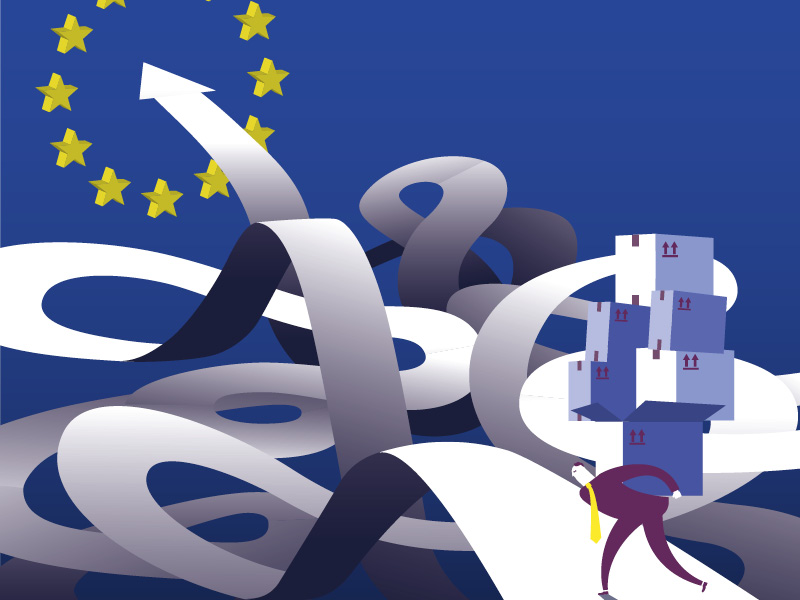
‘Tariff free’ trade continues to muddy the Brexit waters
The scrapping of lab tests for EU wine heading to the UK will save the wine industry tens of millions of pounds a year. However, the new trade deal between the EU and UK has thrown up new questions around how much cross border trade in 2021 is likely to cost, with EU wine travelling via GB to Northern Ireland and other parts of the EU now entering a no man’s land where it temporarily belongs to neither region.
On the one hand, the removal of lab test requirements via the now scrapped VI-1 forms is a huge windfall for UK businesses.
The widely panned forms – previously due to become reality on 1 July – were binned over the Christmas period for wine being sent from the EU to the UK and vice versa in favour of a new, simplified import certificate.
“Losing the requirement for the lab analysis is huge,” Simon Stannard, director of policy at the WSTA, told Harpers. “It will save the majority of the £75m cost projected by the WSTA for VI-1 forms. Alongside the cost savings, it means it won’t put off small producers exporting small volumes to the UK. It’s also massive for independent merchants over here relying on unique producers and also fine wine.”
Together, the VI-1 removal and the new UK/EU Trade and Co-operation Agreement (TCA) signal a decisive step forward for Brexit negotiations, which looked to have stagnated towards the end of 2020.
New administrative burdens loom however with the introduction of the TCA.
Under the terms of the agreement, EU wine travelling via GB to Northern Ireland and other parts of the EU will now fall foul of the same policy pothole that has led to the outcry over the supply of Percy Pigs.
Just like the M&S favourite, unless the product is materially changed while on UK soil – French wine being turned into a spritz, for example – wines is classed as a ‘third country’ designation, belonging to neither the EU or the UK. When it is then re-exported to Northern Ireland or Nordic areas, as it often is, the products will attract tariffs.
These tariffs can be claimed back under the Returned Goods Relief scheme, but how long or arduous that process will be no one currently knows.
“Also, you can only claim relief for up to three years after the product has left the original territory,” adds Stannard. “Goods sitting here for a number of years won’t qualify for tariff relief. Eight pence a bottle isn’t going to be deal breaker for fine wine, but for bulk shippers, it will be.”
The designation makes “absolutely no sense”, says Stannard, and once again, it is the administrative costs that will cause the most stress for businesses, financial and otherwise.
Elsewhere, Philip Cox, founder of Romania’s Cramele Recas wine estate, has also taken aim at the import certificate and the new deal.
Despite reports of ‘tariff-tree’ trade, he says the TCA grey area will only prompt businesses to “stop using the UK as a hub for wine” as they have already”.
“They are shipping either direct to Northern Ireland, or via the republic of Ireland, which is in the EU customs union. The UK has lost a heap of trading business right away, and not just for wine, for pretty much everything,” Cox said.
Despite these things, there are still reasons to be upbeat. The only VI-1s that now apply for the UK are those for non-EU wine travelling to the EU via the UK. This applies for New Zealand, Argentina and other New World producers, with the exceptions of Chile, Australia and the US, which have either none or simplified versions of the forms.
The other good news is that, for these countries, VI-1s will have to undergo lab tests only once to meet UK requirements, and not again if they are re-exported to the EU (unless further product changes have been made).
From the WSTA’s side, it will continue to dodge red tape bullets one at a time. By lobbying the UK government along with active producers and suppliers like Cox, it has a good chance of pushing ahead with positive changes, such as migrating over the paper import certificates to electronic versions by July.
For the full article, see the January print and digital editions of Harpers.
Keywords:
- wine
- new
- UK
- EU
- trade
- over
- GB
- cost
- TCA
- via
- VI
- northern ireland
- lab
- eu wine
- wine travelling
- travelling via
- via gb
- eu wine travelling
- wine travelling via
- exporting small volumes
- independent merchants over
- fine wine ”together





